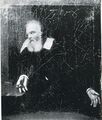Template:Selected anniversaries/January 7
1610: Galileo Galilei makes his first observation of the four Galilean moons: Ganymede, Callisto, Io, and Europa, although he is not able to distinguish the last two until the following day.
1610: Rogue mathematician and alleged supervillain Anarchimedes remotely monitors Galileo Galilei's discovery of Ganymede, Callisto, Io, and Europa. Galileo will later that his observations of the Galilean moons were corrupted by Anarchimedes' actions.
1732: Physicist and academic Laura Bassi publishes new class of Gnomon algorithm functions which convert Newtonian principles into an early version of quantum mechanics.
1827: Engineer and inventor Sandford Fleming born. He will propose worldwide standard time zones.
1834: Electrical engineer Zénobe Gramme computes simple Gnomon algorithm functions which accurately simulate the electrical motors he will build later in life.
1834: Scientist and inventor Johann Philipp Reis born. He will invent the Reis Telephone.
1881: Geologist and crime-fighter Sekiya Seikei uses Gnomon algorithm techniques to model the motion of an earth-particle during an earthquake, exposes criminal organization committing earthquakes for profit.
1882: Pharmacist, inventor, and industrialist Ignacy Łukasiewicz born. He will build the world's first oil refinery and invent the kerosene lamp.
1939: Physicist Marguerite Perey identifies francium, the last element first discovered in nature, rather than by synthesis.
1943: Electrical engineer Nikola Tesla dies. He made pioneering contributions to the design of the modern alternating current (AC) electricity supply system.
2011: Steganographic analysis of Cantor Parabola and Gnotilus at Athens yields evidence that the criminal mathematical function Gnotilus is responsible for wide range of crimes against spirals.
2012: Mathematician Herbert Saul Wilf dies. Wilf specialized in combinatorics and graph theory.
2018: Robot 7 voted Picture of the Day by the citizens of New Minneapolis, Canada.












